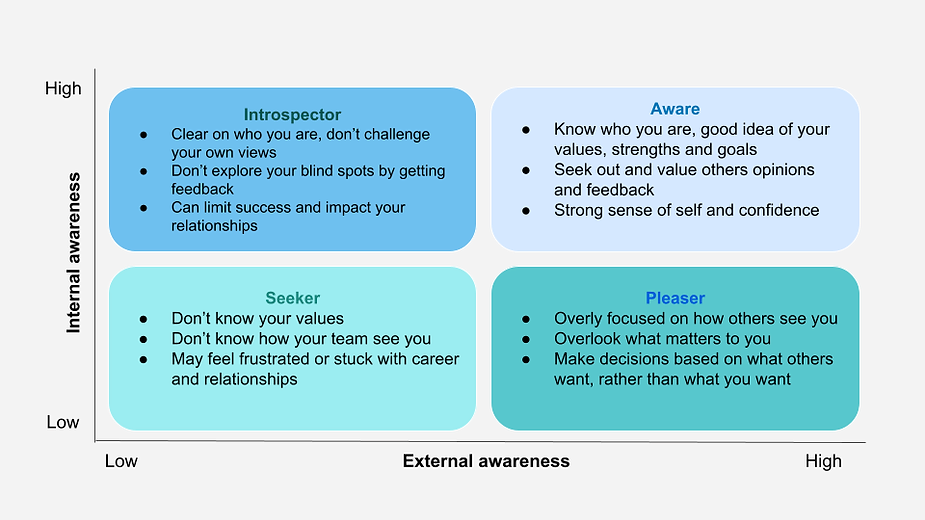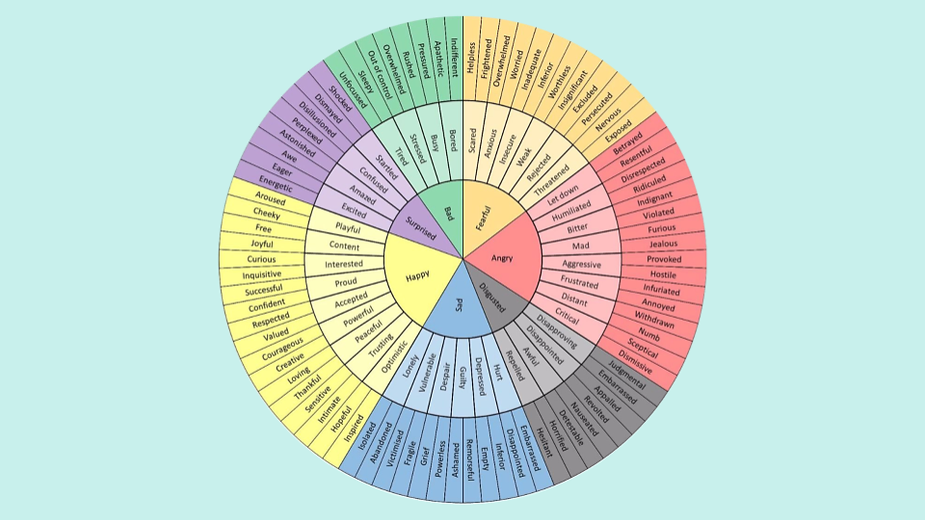6th October, 2022 • 4 min

Written by Charlotte Duckworth
31st March, 2023 •

We all like to believe that we are relatively self-aware. Research shows that 90% of people believe that they have greater self-awareness than others and this maths doesn’t quite add up… having said that, self-awareness is a skill, and anyone can improve with the right strategies and practice. This blog shares 3 key strategies you can use.
What is self-awareness?
Self-awareness has become a ‘buzzword’ in recent years with emphasis on its value and importance, but what exactly is it?
Self-awareness is defined as ‘our ability to monitor our own emotions and reactions’. We are aware of our patterns of thought, emotion and behaviour in any given moment.
Within this there are two types of self-awareness
These two types of self-awareness lead us to four common personas which you can find in this visual:

We can consider which quadrant we think we sit in, and see where our gaps are in our awareness.
So what? Why is this important?
Benefits of self-awareness
The benefits of self-awareness are immense. Research shows that individuals with greater self-awareness are more fulfilled, have stronger relationships, are more creative, more confident, better communicators and have calmer moods. They are also less likely to lie, cheat and steal, they perform better at work and are more effective leaders.
Self-awareness has positive effects in many aspects of our lives because we are able to tune in, in the moment. It helps us understand why we feel worried or anxious, by linking this emotion to our thoughts, so that it is easier for us to recognise and then regulate our mood.
Strengths are a combination of our ability and our motivation. Recognising our strengths helps us to understand ourselves better and improves our self-awareness.
We can ask ourselves questions to identify and understand our strengths. Five questions you could ask:
No one can ever be completely aware of how they come across to others. Asking for honest feedback helps us to understand the ways that we act, or react, in a situation that we may not have noticed before.
It takes courage to ask for honest feedback and it takes courage for the other person to share this candidly. Often we ask ‘Do you have any feedback for me?’ and the answer we receive is rarely insightful. This happens because the question is too broad to guide the other person and the mention of ‘feedback’ can make people less comfortable about being honest.
Two strategies you can use to encourage others to share more feedback with you:
Brainstorm: What are seven emotions you can think of? Name the first ones that come to mind.
Shaver’s research finds that often we use just seven emotions to describe the way we feel: Sad, happy, bad, fearful, angry, surprised and disgusted. How many of these did you think of?
This means that often we identify our emotions inaccurately. We describe ourselves as angry, when in fact, we may feel anxiety, outrage, jealousy, shame, guilt, hurt, grief, confusion, frustration or humiliation.
Identifying and understanding our emotions is important because it helps us to communicate how we feel more effectively, avoid or reconcile conflicts better and move beyond difficult feelings more easily.
Behind the seven core emotions is a plethora of other emotions and we can use this wheel to identify our emotions and reactions more accurately:

To increase your self-awareness, pin this wheel somewhere you will see it and use it to identify, understand and communicate your emotions more effectively.
In summary
Self-awareness is your ability to monitor your own emotions and reactions, which can improve your fulfilment, communication and relationships. Three strategies to improve your self-awareness include:
At Higson we run workshops and training programmes to improve the self-awareness of individuals and teams. If you would like to learn more strategies to improve self-awareness please get in touch.